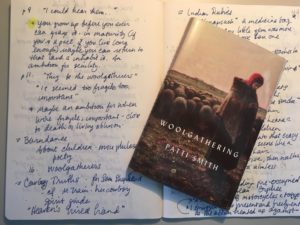
Patti Smith | Woolgathering (NY: New Directions, 2011) | Amazon | Indie bookstore
In Woolgathering, Patti Smith (the child Patti) is tucked into bed by her mom. Then she gets out of bed and climbs onto a chair to look out the window “and continue my prayers, wandering.” She sees in a field across the road:
people like none I had ever seen, in strange archaic cap and dress. I used to think I could see the white of their bonnets and, at times, a hand, in the act of grasping, illuminated by the moon and stars or the light from a passing car.
She has no reference or label for this quiet, gentle crowd “bathed in pale clairvoyance,” until she asks “the oldest man in the oldest house” in her neighborhood. He answers, “without so much as moving his lips:”
They be the woolgatherers…
That’s the plot of Smith’s little book. Throughout her written wanderings, grown up and childish, she returns to woolgathering.
(Was the old man playing a prank on the child?)
I’ve done a fair amount of woolgathering myself, lately. My mother’s way of aging makes it difficult for her to converse, so most of the time when I’m visiting we just sit around. I space out, I don’t know what’s going on with her, but we’re generally content. Smith’s Woolgathering brings those hours with mom to me, along with fears of age, everyone’s fear of age, these days, that you’ll end up with nothing to offer, nothing to do, no steady points of reference. Will you forget them: your beloved friends, your children, your spouse of decades long? Pictures of people you may or may not recognize decorate your room.
(Or the old sage knew exactly what it’s about: woolgathering.)
You grow up as fast as you can, you hurry into maturity, toward oblivion, not leaving yourself time to figure out what it means to be a woolgatherer:
Bending, extending, shaking out the air. Gathering what needs to be gathered. The discarded. The adored. Bits of human spirit that somehow got away. Caught up in an apron. Plucked by a gloved hand.
Unless you’re a poet. A person who takes time to do something as useless as writing poetry might very well be a woolgatherer.
I was not at all sure what a woolfatherer was but it sounded a worthy calling and seemed a good job for me.… And I wandered among them, through thistle and thorn, with no task more exceptional than to rescue a fleeting thought, as a tuft of wool, from the comb of the wind.
I’d like to think of my mother as a woolgatherer, though she never wrote poetry, as far as I know. I get phone calls from her: Where am I? This isn’t my room. Yes, it is, mom, look, see the picture of dad? The glass rose he gave you? The painting of Venice…?
Patti blunders into a cafe, with a headache that brings on daydreams of the guillotine:
It occurred to me that I wasn’t sure where the hell I was.
“A Farewell,” the last section of Woolgathering.
How happy we are as children. How the light is dimmed by the voice of reason….
A child’s hand offers a dandelion.
Make a wish, blow….
Having my breath what more could I wish for.
The book goes on a few more paragraphs. Patti Smith is older than I am, but who knows which of us is closer to the end, to that last breath. For whatever reason, for me, the best end of the book is there:
Having my breath what more could I wish for.
Very fine review of Patti Smith’s book. Her work is rich and surprising. Wonderful if readers can find her experience in their own lives. Better still, if they can write a review like Jean Huets has done.
Thank you, my dear heart. This is my favorite, I think, of Patti’s books.